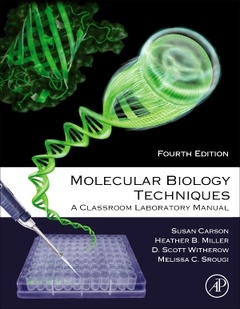Description
Molecular Biology Techniques (4th Ed.)
A Classroom Laboratory Manual
Authors: Carson Sue, Miller Heather B., Srougi Melissa C., Witherow D. Scott
Language: English
Subject for Molecular Biology Techniques:
Keywords
Affinity chromatography; Agarose gel; Annealed oligo cloning; BSA; Bradford; CDNA; CRISPR; Cell culture; Chromas; Chromatogram; Cleavage; Computational; Cultures; DNase; Dilution; E coli; EGFP; Egfp; Electrophoresis; Escherichia coli; Expression; Expression vector; Fluorescence; Fusion protein; HEK293; IPTG; Indel; Inoculating; Ligation; Lysis; MRNA; Mammalian cells; Micropipette; Microscope; Miniprep; Oligo; PCR; PCR screen; PET-41a; Plasmid; Plating; Primer; Protein expression; Purified; QPCR; Quantification; RNA; RNAi; RNeasy; Replica plate; Replica plating; Restriction enzyme; Reverse transcription; SDS–PAGE; Screening; Sequencing; SgRNA; SiRNA; Spin column; Spin-column; Stable; Sterile; Transfection; Transformants; Transformation
Approximative price 112.59 €
In Print (Delivery period: 14 days).
Add to cart294 p. · 21.4x27.6 cm · Paperback
Description
/li>Contents
/li>Readership
/li>Biography
/li>Comment
/li>
Molecular Biology Techniques: A Classroom Laboratory Manual, Fourth Edition is a must-have collection of methods and procedures on how to create a single, continuous, comprehensive project that teaches students basic molecular techniques. It is an indispensable tool for introducing advanced undergraduates and beginning graduate students to the techniques of recombinant DNA technology?or gene cloning and expression. The techniques used in basic research and biotechnology laboratories are covered in detail. Students will gain hands-on experience on subcloning a gene into an expression vector straight through to the purification of the recombinant protein.
Part I: Manipulation of DNAAdvanced Alternatives Within Part I 1. Getting Oriented; Practicing With Micropipettes 2. Purification and Digestion of Plasmid (Vector) DNA3. Completion of Vector Preparation and Polymerase Chain Reaction Amplification of egfp 4. Preparation of Insert DNA (egfp) PCR Product5. DNA Ligation and Transformation of Escherichia coli
Part II: Screening TransformantsAdvanced Alternatives Within Part II6. Screening of Transformants, Part I 7. Screening of Transformants, Part II8. Analysis of DNA Sequence From a Positive Clone, Part II
Part III: Expression, Detection, and Purification of Recombinant Proteins from BacteriaAdvanced Alternatives Within Part III 9. Expression of Fusion Protein from Positive Clones, SDS_PAGE and Western Blot: Part I 10. Expression of Fusion Protein from Positive Clones, SDS_PAGE, and Western Blot: Part II 11. Extraction of Recombinant Protein From Escherichia coli Using a Glutathione Affinity Column12. Analysis of Purification Fractions
Part IV: Analysis of mRNA Levels13. Total RNA Purification14. Analysis of gst::egfp mRNA Levels by RT-qPCR: Part I15. Analysis of gst::egfp mRNA Levels by RT-qPCR: Part II 16. Analysis of gst::egfp mRNA Levels by Semiquantitative RT-PCR: Part I 17. Analysis of gst::egfp mRNA Levels by Semiquantitative RT-PCR: Part II
Part V: Modulation of Gene Expression18. Culturing Mammalian Cells19. Transient Transfection of Mammalian Cells20. RNAi-Mediated Knockdown of EGFP: Part I 21. RNAi-Mediated Knockdown of EGFP: Part II22. RNAi-Mediated Knockdown of EGFP: Part III23. CRISPR-Mediated Knockout of EGFP: Part I24. CRISPR-Mediated Knockout of EGFP: Part II 25. Advanced CRISPR: Part I 26. Advanced CRISPR: Part II27. Interim Laboratory Session 28. Advanced CRISPR: Part IV 29. Advanced CRISPR: Part V30. Advanced CRISPR: Part VI
AppendixA: Equipment B: Prep List C: Preparation of Competent Escherichia coli Cells D: Pre-Lab Questions
Graduate and undergraduate students studying biochemistry, molecular biology, biotechnology, and cell biology
Dr. Melissa C. Srougi is an Assistant Professor of Biochemistry at High Point University. She graduated from the University of Toledo (Toledo, OH) with a B.S. in Biology, and from Case Western Reserve University (Cleveland, OH) with a Ph.D. in Pharmacology. Her scientific areas of expertise are in experimental cancer chemotherapeutic agents and mechanisms of chemotherapeutic resistance. Dr. Srougi actively trains undergraduate research students in her laboratory. In addition, she has developed and taught a variety of inquiry-based college level science courses and has published and presented a number of peer-reviewed papers in the scholarship of teaching and learning.
Dr. Witherow graduated from Rollins College (Winter Park, FL) with an A.B. in Chemistry, and from the University of Miami (Miami, FL) with a Ph.D. in Molecular and Cellular Pharmacology. His research has focused primarily on G protein-mediated signal transduction processes in mammalian systems. Following two research postdoctoral fellowships, Dr. Witherow served as a teaching postdoctoral fellow at North Carolina State University, where he published and presented multiple papers in the field of science education and developed a passion for teaching. He is currently an Associate P
- Presents student-tested labs proven successful in real classroom laboratories
- Includes a test bank on a companion website for additional testing and practice
- Provides exercises that simulate a cloning project that would be performed in a real research lab
- Includes a prep-list appendix that contains necessary recipes and catalog numbers, providing staff with detailed instructions




